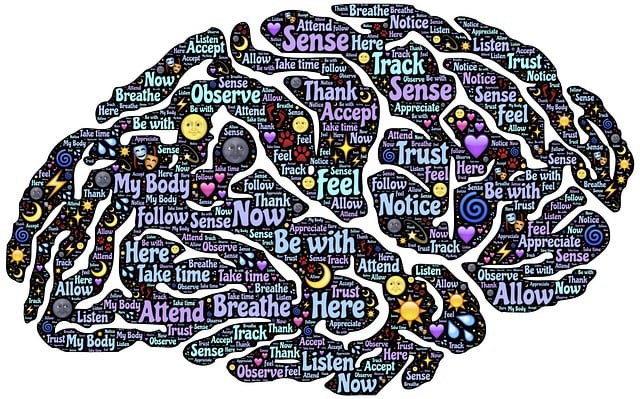Highlands Ranch Codependency Therapy tackles a hidden but serious issue—codependency—impacting mental well-being. Through professional guidance, individuals learn to recognize and break unhealthy patterns by setting boundaries, promoting independent thinking, and enhancing self-worth. This holistic approach combines evidence-based practices like Social Skills Training and Stress Management Workshops, empowering clients with lifelong skills for improved mental wellness. Measuring success through clear outcomes and regular evaluations ensures the program adapts to individual progress, fostering sustainable mental health over time.
Mental wellness coaching programs, especially those tailored to codependency in Highlands Ranch, are gaining traction as powerful tools for personal growth. This article delves into the intricacies of codependency and its impact on mental health, highlighting the pivotal role coaches play in addressing these behaviors. We explore evidence-based techniques incorporated into Highlands Ranch codependency therapy and provide insights on designing effective coaching programs for recovery. Additionally, we discuss measuring success and fostering continuous improvement in these transformative interventions.
- Understanding Codependency and Its Impact on Mental Health
- The Role of a Coach in Addressing Codependent Behaviors
- Designing Effective Coaching Programs for Recovery
- Incorporating Evidence-Based Techniques in Highlands Ranch Codependency Therapy
- Measuring Success and Continuous Improvement in Coaching Interventions
Understanding Codependency and Its Impact on Mental Health

Codependency, a complex psychological phenomenon, often goes unnoticed but significantly impacts mental health and well-being. It’s characterized by an excessive reliance on others for emotional validation and stability, usually resulting from early life experiences. In Highlands Ranch Codependency Therapy, professionals aim to help individuals recognize these patterns and develop inner strength.
This condition can lead to a range of issues, including anxiety relief being elusive as individuals often project their fears onto others. A thorough risk assessment for mental health professionals is crucial to identifying codependent tendencies in clients. Through therapy, individuals learn to set healthy boundaries, foster independent thinking, and cultivate a sense of self-worth, thereby improving their overall mental health and fostering positive relationships.
The Role of a Coach in Addressing Codependent Behaviors

In addressing codependent behaviors, a mental wellness coach plays a pivotal role by providing individuals from Highlands Ranch Codependency Therapy with tailored guidance and support. Coaches help clients recognize unhealthy patterns in their relationships and decision-making processes, fostering self-awareness through structured Mental Wellness Journaling Exercises. By encouraging introspection and reflection, coaches assist individuals in identifying triggers and developing healthier coping mechanisms, which are essential components of codependency therapy.
Furthermore, mental wellness coaching extends beyond individual sessions by incorporating strategies for advocating for better Mental Health Policy Analysis and Advocacy. Coaches empower clients to navigate societal and systemic barriers, promoting a more inclusive environment that prioritizes mental health education. Through designing engaging Mental Health Education Programs, coaches help dispel stigma and educate communities on recognizing signs of codependency and other mental health issues, ultimately contributing to a holistic approach in improving mental wellness.
Designing Effective Coaching Programs for Recovery

In designing effective coaching programs for recovery, especially focusing on codependency therapy in Highlands Ranch, it’s crucial to tailor interventions that address the unique needs and challenges faced by individuals seeking healing. A well-structured program should incorporate a blend of evidence-based practices, such as Social Skills Training and Communication Strategies, to foster healthier relationships and improve emotional regulation. By integrating these techniques, coaches can empower clients to navigate their personal journeys with enhanced self-awareness and effective coping mechanisms.
Moreover, incorporating Stress Management Workshops within the coaching framework enables participants to develop resilience against triggers and relapses. These workshops can provide practical tools and strategies for managing stress, anxiety, and potential emotional turmoil, thereby reinforcing the recovery process. When designed thoughtfully, such programs not only offer a supportive environment but also equip individuals with lifelong skills to maintain mental wellness, even beyond the confines of traditional therapy settings.
Incorporating Evidence-Based Techniques in Highlands Ranch Codependency Therapy

Incorporating evidence-based techniques is a cornerstone of effective Highlands Ranch Codependency Therapy. By integrating strategies from Burnout Prevention Strategies for Healthcare Providers and Risk Management Planning for Mental Health Professionals, therapists can create a robust framework to address codependency. These methods are designed to enhance resilience, improve communication patterns, and foster healthier relationships—all vital aspects in managing and overcoming codependent behaviors.
The approach focuses on empowering individuals to recognize and modify unproductive dynamics, reducing the risk of relapse and promoting long-term recovery. Furthermore, by incorporating evidence-based practices, therapists can better equip clients with tools to manage stress, anxiety, and depression, thereby preventing relapse and enhancing overall mental wellness. This holistic strategy ensures that Highlands Ranch Codependency Therapy remains effective and relevant in addressing complex emotional issues.
Measuring Success and Continuous Improvement in Coaching Interventions

Measuring success and fostering continuous improvement are vital components of effective mental wellness coaching programs, especially in addressing complex issues like codependency. High-quality coaching interventions should be designed with clear outcomes and measurable criteria to ensure accountability and effectiveness. This involves setting specific goals tailored to each client’s unique needs, often focusing on enhancing self-care routine development for better mental health. Coaches can utilize various assessment tools to gauge progress, such as pre-and post-intervention surveys, client feedback, and structured interviews. By collecting and analyzing these data points, coaches can identify areas of success and pinpoint aspects that require refinement.
Regular evaluation allows for the adaptation of coaching strategies, incorporating evidence-based techniques like conflict resolution methods to address emerging challenges. This iterative process ensures that the program remains dynamic and responsive to individual progress. For instance, a coach working with clients in Highlands Ranch, Colorado, can track improvements in self-care practices and emotional regulation while also refining their approach based on client feedback. Such continuous improvement is key to fostering sustainable mental wellness and ensuring that coaching interventions remain impactful over time.
Mental wellness coaching programs, particularly those tailored for codependency issues in Highlands Ranch Codependency Therapy, have proven to be transformative. By combining understanding, evidence-based techniques, and continuous improvement, these programs offer a supportive environment for recovery. Coaches play a vital role in addressing codependent behaviors, enabling individuals to navigate their journeys towards improved mental health effectively. Through measuring success and incorporating diverse techniques, such as those used in Highlands Ranch Codependency Therapy, coaching interventions can be fine-tuned to meet the unique needs of each individual, fostering long-term wellness.














